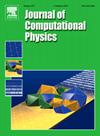Klein-Gordon-Schrödinger方程的无条件稳定显式指数方法
IF 3.8
2区 物理与天体物理
Q2 COMPUTER SCIENCE, INTERDISCIPLINARY APPLICATIONS
引用次数: 0
摘要
本文给出了一个框架,用于导出耦合Klein-Gordon-Schrödinger (KGS)方程的无条件稳定显式指数方法。该方法基于哈密顿算子或算子分裂。将KGS方程分解为三个独立的线性方程,经过适当的空间离散化,用指数法精确求解,得到两种在时间上具有任意阶精度的显式指数法。证明了该方法是时间对称的、无条件稳定的、质量守恒的。特别地,推导出的哈密顿分裂方法是辛的,因此几乎保留了能量。证明了二阶方法在时间上的收敛性。此外,我们提出了一种利用快速傅立叶变换(FFT)技术的快速实现方法,一旦为KGS方程规定了周期边界条件。最后,用二阶和四阶(时间上)方法对一维和二维KGS方程进行了检验。数值结果表明,本文提出的方法具有效率高、稳定性好、与网格比例无关、能量和质量守恒性好、适用于大时间步长等优点。本文章由计算机程序翻译,如有差异,请以英文原文为准。
Unconditionally stable explicit exponential methods for the Klein–Gordon–Schrödinger equations
In this paper, we present a framework to derive unconditionally stable explicit exponential methods for the coupled Klein–Gordon–Schrödinger (KGS) equations. The approach is based on the Hamiltonian or operator splitting. By splitting the KGS equations into three independently linear equations and solving these equations exactly with exponential methods after suitable spatial discretization, two kinds of explicit exponential methods are obtained, which could be of any order accuracy in time. It is proved that the proposed methods are time-symmetric, unconditionally stable, and mass-preserving. In particular, the derived Hamiltonian-splitting methods are symplectic and thus nearly preserve the energy. The convergence of the second-order (in time) methods is also proved. Moreover, we present a fast implementation with the Fast Fourier Transform (FFT) technique once periodic boundary conditions are prescribed for the KGS equations. Finally, 1D and 2D KGS equations are tested with the second-order and fourth-order (in time) methods. Numerical results demonstrate the high efficiency, unconditional stability with the independence of the mesh ratio, good energy and mass conservation, and applicability of large time stepsizes of the methods proposed in this paper.
求助全文
通过发布文献求助,成功后即可免费获取论文全文。
去求助
来源期刊

Journal of Computational Physics
物理-计算机:跨学科应用
CiteScore
7.60
自引率
14.60%
发文量
763
审稿时长
5.8 months
期刊介绍:
Journal of Computational Physics thoroughly treats the computational aspects of physical problems, presenting techniques for the numerical solution of mathematical equations arising in all areas of physics. The journal seeks to emphasize methods that cross disciplinary boundaries.
The Journal of Computational Physics also publishes short notes of 4 pages or less (including figures, tables, and references but excluding title pages). Letters to the Editor commenting on articles already published in this Journal will also be considered. Neither notes nor letters should have an abstract.
 求助内容:
求助内容: 应助结果提醒方式:
应助结果提醒方式:


